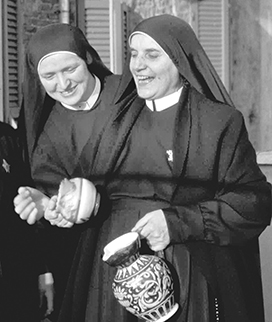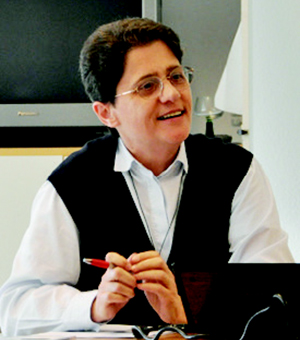Like many Daughters of St. Paul of my generation, I got to know Maestra Thecla through her writings and the testimonies of FSPs of the “first hour.” A particularly precious moment for me in this journey of discovery occurred in 1994 when, among the initiatives organized to celebrate the centenary of her birth, an international contest was held and the provincial government of Italy asked me to write a short biography of Maestra Thecla.
In doing so, I was struck by 3 of her characteristics that I think are essential for a religious and especially for a religious to whom divine Providence has entrusted the responsibility for the formation and orientation of a Congregation, as was true in her case:
- A motherly spirit. I regret that I never knew Prima Maestra personally because I believe she was a great gift to the Daughters of St. Paul who were able to meet her and experience her maternal welcome and benevolence, her concern for small things (including attention to the situations of their families), her attentiveness and diligence in providing for necessities, and her example of humility and fervor.She witnessed by means of her life to the truths she affirmed and taught, showing us a style of leadership (to use a modern term) modelled on the heart of God. “Although the FSPs do not speak from the front of a classroom,” she said, “it is our duty to teach and we do this more than anything else by means of our example: that of prayer, piety and observance of community life. We must be an example to everyone” (CSAS 147). “Welcome the sisters when they return home tired after a day of propaganda or when they have been away [from the community] for a long time. Make sure that they feel warmly received and that they have returned home…. They should feel that there is a heart that loves them and is looking after them” (Ibid.).

- Trusting (not blind) obedience toward the directives of Fr. Alberione. The relationship between M. Thecla and Fr. Alberione illustrates how true it is that, many times in the history of the Church, a great man has had at his side a great woman. Prima Maestra was a woman of strong faith, ready to follow what at times was probably an unclear path, to participate in and assume the charism gifted by the Spirit to Primo Maestro and certainly to a good extent also to her. And she expressed this through her role as an intermediary, characterized by a wisdom, simplicity, clarity and decisiveness that offered direction to many sisters in diverse situations:
“It is Primo Maestro who gave us life and so we must accept his words the same way we accept the words of the Gospel,” she declared. “If we do what he tells us, we can rest assured that we are not making a mistake, even though at times it might seem to us that [a directive] might not be quite on target. Who knows how much Primo Maestro prayed about it!” (CSAS 23)
- Her acceptance and appreciation of every diversity and her openness to all peoples, which she translated into esteem for every gift, every human characteristic, every culture. She welcomed everything under the gaze of God, reading every event and every encounter from this perspective. In each situation, she recognized the presence of a human and Christian value that could be highlighted; an expression of good that could be cultivated, promoted and made known:
“Let us big-hearted,” she urged. “Let us hold all people in our hearts and recommend them to the Lord. […] We must really love souls more! […] Let us feel the responsibility to help and pray for the many unfortunate people who do not yet know the Lord, and let us ask him for the grace to bring them the Gospel” (CSAS 38). “If we are to do good to souls, we must become holy. Our apostolate is to do good, so we must feel an insatiable thirst for souls!” (CSAS 143)
My hope for myself and for all the Daughters of St. Paul is that we may be, on a daily basis, the “thousand lives” for which Maestra Thecla yearned, so as to put them all at the service of the Gospel, proclaimed through the most modern and effective means, urged on by the desire to reach every culture, aware that we have received a precious gift to share: the grace of the maravelous Pauline vocation.
Gabriella Collesei, fsp
